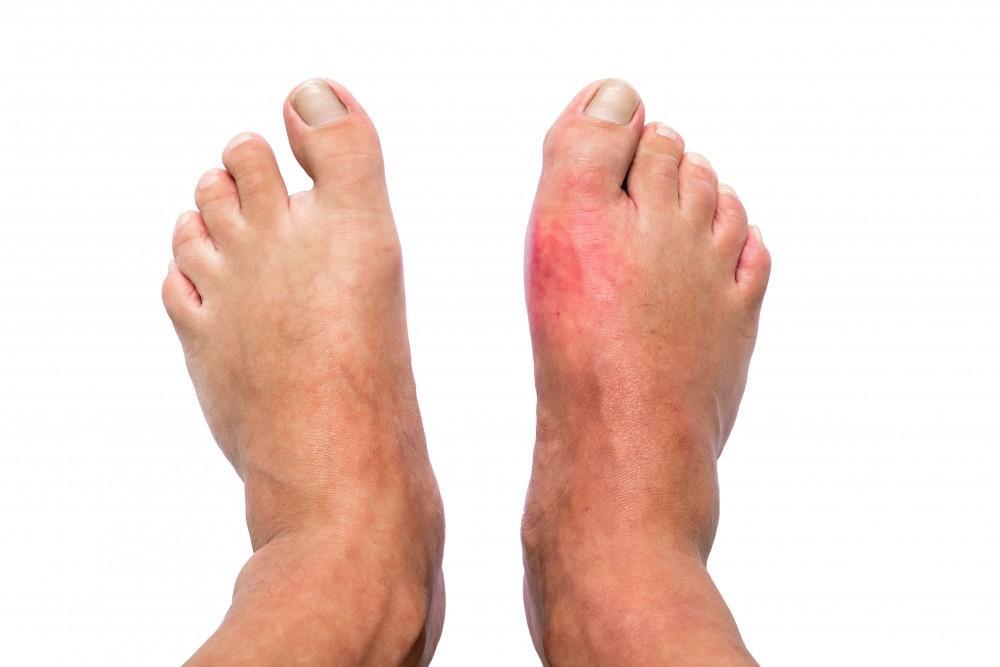
Help! Is That Pain in My Toe Gout?

When you suddenly feel a sharp, stabbing pain in your big toe, your first thought probably isn’t gout. After all, gout’s the condition that stereotypically affects rich people who eat rich foods. But if you don’t remember injuring your toe and it throbs painfully, you might be just rich enough for gout.
At Rheumatology Center of New Jersey, our expert team of rheumatologists treats gout and other forms of arthritis and joint pain at our four New Jersey locations: Somerville, Princeton, Flemington, and Monroe. If your big toe hurts, here are a few clues that it might be gout.
Your toe is red, swollen, and painful
Gout is caused by uric acid crystals that collect in your joint, causing inflammation. If you have gout, you may feel like your toe’s being stabbed by needles. Your toe could also be swollen and red. When you touch your toe, it may feel hot.
Gout usually affects just one big toe joint, but it can affect other joints in the same foot and leg, such as your toe joints, ankle, and knee.
Your diet’s rich in purines
Even if you think you have a healthy diet, you could contract gout. If you eat an abundance of foods that are high in purines, your body may not be able to process them.
Purines are natural chemicals made of carbon and nitrogen that exist in the cells of all plants and animals. Your body makes purines and the foods you eat contain purines, too. Some foods, though, are extremely high in purines.
Normally, your body breaks down purines into uric acid and then filters that through your liver so you can excrete it through urination. But if you eat too many purines or if your liver isn’t working properly, you can’t process all of the uric acid, and it begins to crystallize and settle in your joints.
Foods that are high in purines include:
- Red meat and game meats
- Organ meats and sweetbreads
- Saturated fats
- Gravy
- Shellfish
- Anchovies, sardines, herring, and tuna
- Alcohol and more specifically Beer.
- Soda and other items with high-fructose corn syrup
- Yeast and yeast extracts
Drinking alcohol limits your ability to process uric acid. Beer is also high in purines because it contains brewer’s yeast.
You have risk factors for gout
Underlying medical conditions, such as liver disease and diabetes, can raise your risk for gout. You’re also more at risk for gout if you:
- Are a man
- Are overweight or obese
- Take diuretics
- Take other types of medications
At Rheumatology Center of New Jersey, we ask you about your diet, lifestyle, and medications you take when evaluating you for gout.
Control gout pain and prevent an attack
Whether you have gout or not, we thoroughly evaluate your toe pain and possible sources so you have the answers you need and a treatment plan that’s individualized for you. If you do have gout, your rheumatologist subdues the pain with anti-inflammatory medications, including steroids on rare occasions.
We also alert you to lifestyle adjustments you need to make to minimize the risk of another flare, such as avoiding purines and drinking more water. We help you with dietary advice and also refer you to other specialists if you have an underlying medical condition that’s raising your risk for future gout attacks.
At a certain point, we may recommend to put you on medications to prevent high uric acid in your system, if you continue to have repeated attacks despite dietary and lifestyle modifications.
Take care of your big toe, and your health, by getting a gout evaluation today. Call our nearest Rheumatology Center of New Jersey office, or request an appointment using our convenient online tool.
You Might Also Enjoy...


Lupus and Pregnancy: Is it Safe?

Don't Let Winter Weather Worsen Your Joint Pain

5 Tips for Traveling When You Have Arthritis

Botox® or Fillers: What’s the Better Choice For Skin Sagging?


